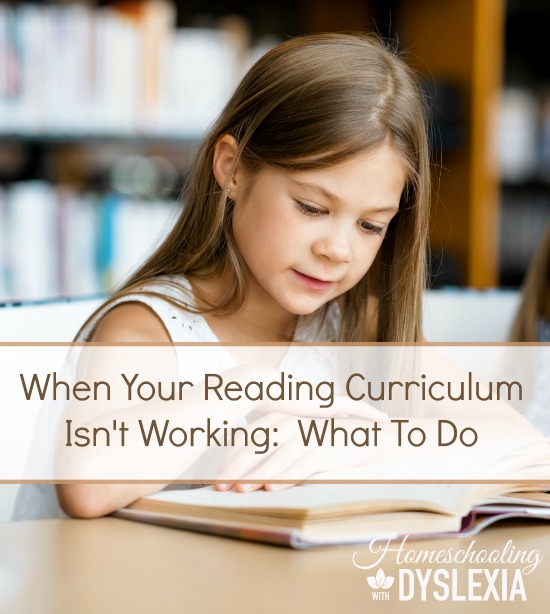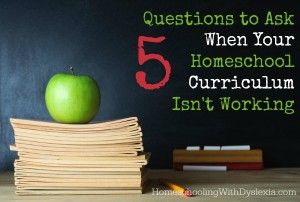
I am asked all the time by homeschooling parents what to do when their child isn’t making significant progress with reading. I so get this. For years I struggled with teaching reading because my kids just weren’t catching on. Because of that I switched reading curriculum frequently.
I no longer switch reading curricula because now I know what works for teaching kids with dyslexia to read. Although progress can be slow at times, I have peace because I know that what I am using is research-based and effective.
Here are 4 things that you need to think about when you feel that your child isn’t making significant progress or that your reading curriculum isn’t working:
1. Choose an Orton-Gillingham Program
First and foremost, your reading curriculum needs to be based upon the Orton-Gillingham (OG) approach. The OG approach to teaching reading has been well-researched and is highly effective with dyslexic learners (and non-dyslexic learners too). If you’re not sure what OG is, read this post that explains the Orton-Gilligham Approach.
There are several affordable, effective, research-based programs that can be used at home without becoming a certified dyslexia tutor. Here are our top picks:
All About Reading All About Reading and their spelling program All About Spelling are hands on, simultaneously multi-sensory introduction into the written word. Lessons are completely scripted so there is little prep time for mom. Specifically designed for the homeschooled student that struggles with reading, this program has all of the elements of an Orton-Gillingham research-based reading program. For more information, click the image below.
Barton Reading Another program designed for parents to teach, completely scripted for easy parent use and Orton-Gillingham based.
Logic of English. One program that I can get behind 110% is Logic of English (LOE). The creators of LOE have a mission to improve literacy around the world and their products are more than capable of doing that.
The Wilson Program Not as user friendly as All About Reading/Spelling or Barton but an affordable, evidence-based program that really works.
Rewards An intervention program for reading and writing designed for grades 6 and up. An excellent resource to increase fluency rates, deepen comprehension and increase precision in sentence writing.
AVKO Spelling Teaches spelling by teaching the patterns of spelling. Some kids do better with this approach to spelling instruction.
Reading Horizons Elevate Reading Horizons Elevate is an online OG program specifically designed for the older struggling reader. Older struggling readers have the same problems as younger readers and need to learn and master the same skills. The key is to find a program that is not ‘babyish’ and that systematically teaches at an intense enough pace to keep progress steady thus motivating the student. Reading Horizons Elevate is all of these things. Click here for more information, my review and purchase options.
Need help choosing your reading curriculum? Read this comparison of the top 4 OG reading programs for homeschoolers.
2. Teach Consistently
In order for reading instruction to be effective, it must take place consistently. As busy homeschool families this can be tough to do! I encourage you that if you are not teaching reading at a very minimum of 3 times per week, to revisit your homeschool schedule and make time for this critically important subject.
This is a season for your family; a season of prioritizing reading instruction above other good and important things. For more tips and strategies for setting up your homeschool schedule, setting realistic goals and getting more done, download my free Ebook, Homeschooling With Dyslexia 101: What You Need to Know About Homeschooling Your Kids With Dyslexia.
3. Teach With Intensity
Another important facet to teaching reading to students with dyslexia is the level of intensity of their instruction. Kids with dyslexia do need to be pushed to work hard and get LOTS of practice with the skills they are learning. This is why it is SO important to have a reading curriculum that offers variety of practice activities and opportunities to practice their reading. Because reading is such hard work, it can be tempting to back off and not push your students. Read this post for a look at how I keep our reading instruction times intense but fun.
I’m Doing All Of These things And My Child is Still Not Progressing!
What should parents do if they are using an OG-based reading program consistently with intensity and are still not seeing significant progress?
Severity of Dyslexia
Dyslexia can be mild, moderate or profound. In my experience, kids with mild to moderate dyslexia do well with an OG program alone.
It is important to remember a couple of things:
- One, all people can learn to read with the right methods.
- Two, students with dyslexia often do not progress at the same rate as traditional learners, even with an OG curriculum.
When to get help
Kids with profound dyslexia, especially if they are getting older, can benefit from hiring an experienced OG tutor.
Our profoundly dyslexic son saw a fantastic Barton tutor for 3 years with very slow progress. He made progress but at the pace he was working, he wouldn’t be reading anything independently for years and he was already late to to the game because we wasted a lot of time with reading methods that didn’t’ work before that.
We moved him to an experienced NILD tutor and his reading skills took off. NILD is unique in that they really treat the underlying weaknesses associated with dyslexia, dysgraphia and dyscalculia as well as teaching reading with the OG approach.
Read more about teaching the profoundly dyslexic child here.
Keeping Long Term Perspective
We all want our kids to read and there is nothing quite so distressing as a child who is 9, 10, 11+ years old who is nowhere near being a fluent reader. Our oldest 2 kids, who did not benefit from my trial and error style of learning about dyslexia, are both readers today. They were 12 and 10 when they learned to read independently.
Our profoundly dyslexic son is now an excellent reader and decent speller. Our current high school senior is taking classes at the community college and earning As and Bs (she also works very hard). All of these kids are dyslexic, either mild, moderate or profound.
Your kids will learn to read! Consistency, intensity, Orton-Gillingham and maybe an intervention with a dyslexia tutor – they will get there in their own time.
In the mean time, allow them time to focus on what they are good at. Give them opportunities to pursue their interests. Interest led learning is the best remedy for a child who doesn’t learn best from books. Provide good quality literature in the form of audio books and take a deep breathe!
How about you? What did you do when your reading curriculum wasn’t working?
Related posts:








Great article! I think one thing that helped my kids was lots of review. When we hit a rough spot, sometimes we just needed to back up and do something easier and review for awhile–solidify things they had recently learned and make sure they were really confident before moving on. Sometimes it’s not a matter of a program not working as much as the child not being quite ready for something new. Some kids are just going to need lots of practice and lots of review.
Thank you for blogging on this. I am in the process of pulling him from public school as he hates it and is so behind.
I believe he is dyslexic from working with him myself. I’m overwhelmed to day the least, if anything even smells like “school”, a lot of himmen & hawin ensue. The more I read about dyslexia the more I see my son as having it.
With that, so begins a new journey of finding what works and what does not in all areas.
I’ve always learned best with a lot of structure, pressure, deadline based motives whereas my son seems the opposite.
I’m scared to death that I’m going to fail him. He wants to be a scientist when he grows up and I need to get him there. I’m doing this on my own as his father is not book smart nor does he take time to do the teaching moments while he has our son on the weekends.
Anyways, it’s good to see there are resources out there albeit I must find affordable ones that work for his learning style of which I’m not even sure what his learning style is or what that really means!
This is my first ever blog comment and I’ll leave it at that.
Thanks.,
Chelsie
Hi Chelsie! How old is your son? You can’t fail him with the attitude that you have. You may have ups and downs (we all do) but the number one thing that affected the lives of successful dyslexics was the presence of 1 caring adult who took the time to help them understand themselves and their dyslexia. Your son will do fine. There is a lot to learn but you’re in the right place. Let me know if you have any other questions!
Blessings,
Marianne